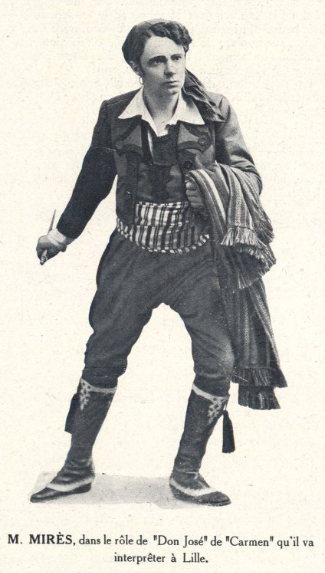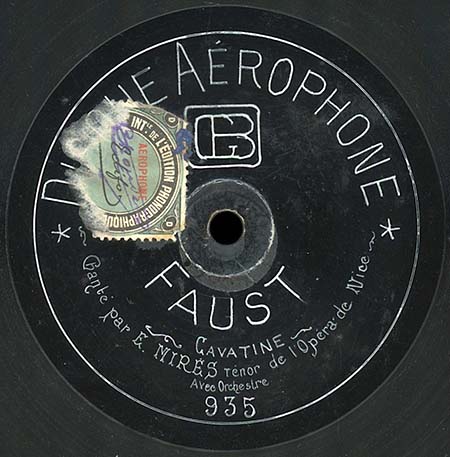Émile Mirès trained his voice with Émile Scaremberg and
Frédéric Boyer.
It would seem that he had his first contract at the Opéra in Nice in winter 1909/10.
In winter 1910/11, he was a member of the Grand-Théâtre in Bordeaux, where he sang Wilhelm Meister, Zéphoris (Si
j'étais roi), Gérald, Werther, Vinicius (Quo vadis?), Nicias and Vincent; he had enormous success, and yet he was
never re-engaged (mysteries of the operatic business).
In October 1911, Mirès was a guest in Roubaix and sang a successful Faust. That fall and winter, he had a contract in Lille, where
he was very well-liked (particularly once more as Faust); in January 1912, he appeared again in Roubaix, this time as Gérald. He
spent the Easter season at the opera theater in Tours (Wilhelm Meister, Don José, Canio, Alfredo,
Werther, Gérald, des Grieux, Pinkerton, Julien and Faust – all that in the course of five weeks). In August 1912, he was
Wilhelm Meister in Dinard.
In 1912/13, he sang in Geneva, opening the season in October as des Grieux, with considerable success.
In July 1913, he was Gérald at the Casino in Cabourg.
In May and June 1914, he sang Puccini's des Grieux at the Capitole in Toulouse.
In November 1917, he was in Dijon for Lakmé.
In June 1919, he was Werther in Mulhouse, and in October Gérald in Marseille.
In October 1920, he made a very successful debut as Werther in Lyon, then in fall and winter 1920/21, he was a member of the theater in
Dijon, singing Cavaradossi, Pinkerton, Don José, Werther (a role that he also sang in Chalon-sur-Saône in November as a
guest) or Turiddu. He would later return to Dijon very often, for operatic concerts with the municipal orchestra. In April 1921, he was
back to Lille for a guest appearance as Almaviva.
In winter 1921/22, he was in a member of the troupe in Rennes, singing Julien or Gérald; the press reported him vocally exhausted
because of too often singing too heavy repertory. After singing Cavaradossi in Brest as a guest in December, he spent the spring season of
1922 there, appearing for instance in Faust and in Henry Février's Gismonda; Mirès enjoyed huge popularity in
Brest. In October, he was in Dunkerque as Werther and Gérald, and in Lille as Werther.
He opened the theatrical year 1922/23 by returning to Lille for a short fall season, and to Dijon for Mignon and Traviata;
then he sang in Mulhouse for the rest of the winter (des Grieux, Jean Gaussin in Sapho, Toinet in Le chemineau, Don
José, Roméo, Dominique in L'attaque du moulin, Hoffmann, Werther, Faust, Mylio, Gérald, Baron Franz in
Dreimäderlhaus); the troupe appeared also in Colmar, where Mirès was Pinkerton, Officier (Conchita by Henri
Contesse) and Hoffmann. In April 1923, he returned to Brest, stepping in for a sick colleague as Werther. In May, he appeared in a rather
unlikely location for operatic performances, at the Cinéma-Palace in Saintes in La traviata. Reviews were excellent, the
theater was empty, though; obviously, the inhabitants of Saintes thought it unlikely, too, that anybody would stage opera in their town.
Unusual repertory on another visit to Lille in April 1924: Yascha in Quand la cloche sonnera by Alfred Bachelet. In November 1924,
Mirès replaced a sick colleague as Gérald in Amiens. From December 1924 to March 1925, he appeared in (then French)
Saigon.
In November 1925, Mirès sings Hoffmann at the Théâtre Municipal in Versailles; in December, Faust in Troyes.
October 1926 found him again in Versailles, appearing in L'attaque du moulin. He spent winter 1926/27 in Troyes, singing for
instance Tonio (La fille du régiment) and Sylvain (Les dragons de Villars) in November, Alfredo in February and
Zéphoris in March.
In January 1928, he appeared in Troyes in Bazin's Le voyage en Chine, and in March in Verdun as Wilhelm Meister. The same year, he
started to give private voice lessons in Paris; from 1929, he also taught at a music school in Belfort, where he would occasionally
sing concerts. From 1934, the address for his private lessons was in Audincourt, where he obviously lived.
References:
- Opéra de Tours archives
- L'avenir de Roubaix-Tourcoing, 6 October 1911
- Bulletin Meusien, 17 March 1928
- Bulletin de la Société Belfortaine d'Émulation 1931
- Colmarer neueste Nachrichten, 12 January & 23 February 1923
- Comoedia, 16 January 1911, 9 October 1911, 19 January 1912, 11 & 18 April 1912, 24 August 1912, 29 July 1913 & 10 October 1921
- Courrier de Saône-et-Loire, 15 November 1920
- La Dépêche de l'Aube, 29 December 1926 & 26 February 1927
- La Dépêche de Brest, 3 December 1921, 3 March 1922, 19 April 1922, 6 May 1922, 12 April 1923
- L'Express de Mulhouse, 15 June 1919, 2 & 6 November 1922, 13 December 1922, 4 & 19 January 1923, 24 February 1923, 25 March 1923
- Le Figaro, 9 June 1914
- Le Grand Écho du Nord de la France, 22 October 1911, 7 April 1921 & 11 October 1922
- L'Impartial Français, 23 October 1920
- L'Indépendant de la Charente-Inférieure, 9 May 1923
- Lyrica, 1 October 1922, plus several issues from 1 November 1928 to 1 January 1936
- Le Ménestrel, 6 January 1922
- Le Midi Socialiste, 30 May 1914
- Le Nord Maritime, 24 October 1922
- Les Nouvelles de Versailles, 4 November 1925 & 6 October 1926
- L'Ouest-Éclair, 26 November 1921
- La Petite Gironde, 15 February 1911
- Le Petit Marseillais, 23 December 1909 & 23 October 1919
- Le Petit Troyen, 6 November 1926, 19 March 1927 & 19 January 1928
- Le Progrès de la Côte-d'Or, 7 November 1917, 19 October 1920, 13 & 17 & 19 November 1920, 3 December 1920, 13 December 1922
- Le Progrès de la Somme, 7 November 1924
- Le Républicain de Belfort, 14 November 1934
- Der Republikaner, 21 December 1922, 9 & 27 January 1923, 6 & 17 March 1923
- Saïgon-Sportif, 19 December 1924 & 6 March 1925
- La Tribune de l'Aube, 22 December 1925
- L'Union Liberale, 29 March 1912
Picture source: Le Nord Illustré, 15 January 1912


